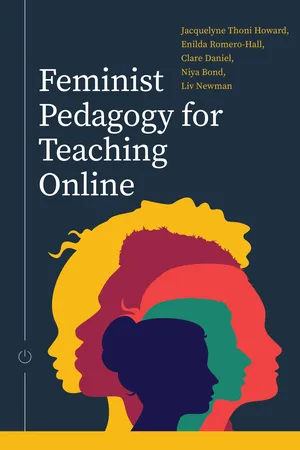
Feminist Pedagogy for Teaching Online
- English
- ePUB (mobile friendly)
- Available on iOS & Android
Feminist Pedagogy for Teaching Online
About this book
Instructors across higher education require inspiring and practical resources for creating, adapting to, and enhancing, online teaching and learning spaces. Faculty need to build collaborative, equitable and trusting online learning communities. This edited volume examines the experiences that interdisciplinary and global feminist educators have had—both their successes and their challenges—in infusing feminist pedagogical tenets into their online teaching and learning practices. Contributors consider how to promote connection, reflexivity, and embodiment; build equity, cooperation, and co-education; and create cultures of care in the online classroom. They also interrogate knowledge production, social inequality, and power. By (re)imagining feminist pedagogy as a much-needed tool and providing practical advice for using digital technology to enact these tenets in the classroom, this collection will empower educators and learners alike.
Frequently asked questions
- Essential is ideal for learners and professionals who enjoy exploring a wide range of subjects. Access the Essential Library with 800,000+ trusted titles and best-sellers across business, personal growth, and the humanities. Includes unlimited reading time and Standard Read Aloud voice.
- Complete: Perfect for advanced learners and researchers needing full, unrestricted access. Unlock 1.4M+ books across hundreds of subjects, including academic and specialized titles. The Complete Plan also includes advanced features like Premium Read Aloud and Research Assistant.
Please note we cannot support devices running on iOS 13 and Android 7 or earlier. Learn more about using the app.
Information
Table of contents
- Cover
- Series Page
- Title Page
- Copyright
- Contents
- Acknowledgements
- Introduction: Priorities of Praxis: Using Feminist Pedagogy to (Re)Imagine Online Classrooms
- Part 1: Promoting Connections, Reflexivity, and Embodiment
- Part 2: Building Equity, Cooperation, and Co-Education
- Part 3: Creating Cultures of Care in the Online Classroom
- Part 4: Interrogating Knowledge Production, Social Inequality, and Power
- Conclusion: Online Feminist Pedagogy: Future Learning Experiences Speculated
- Contributors